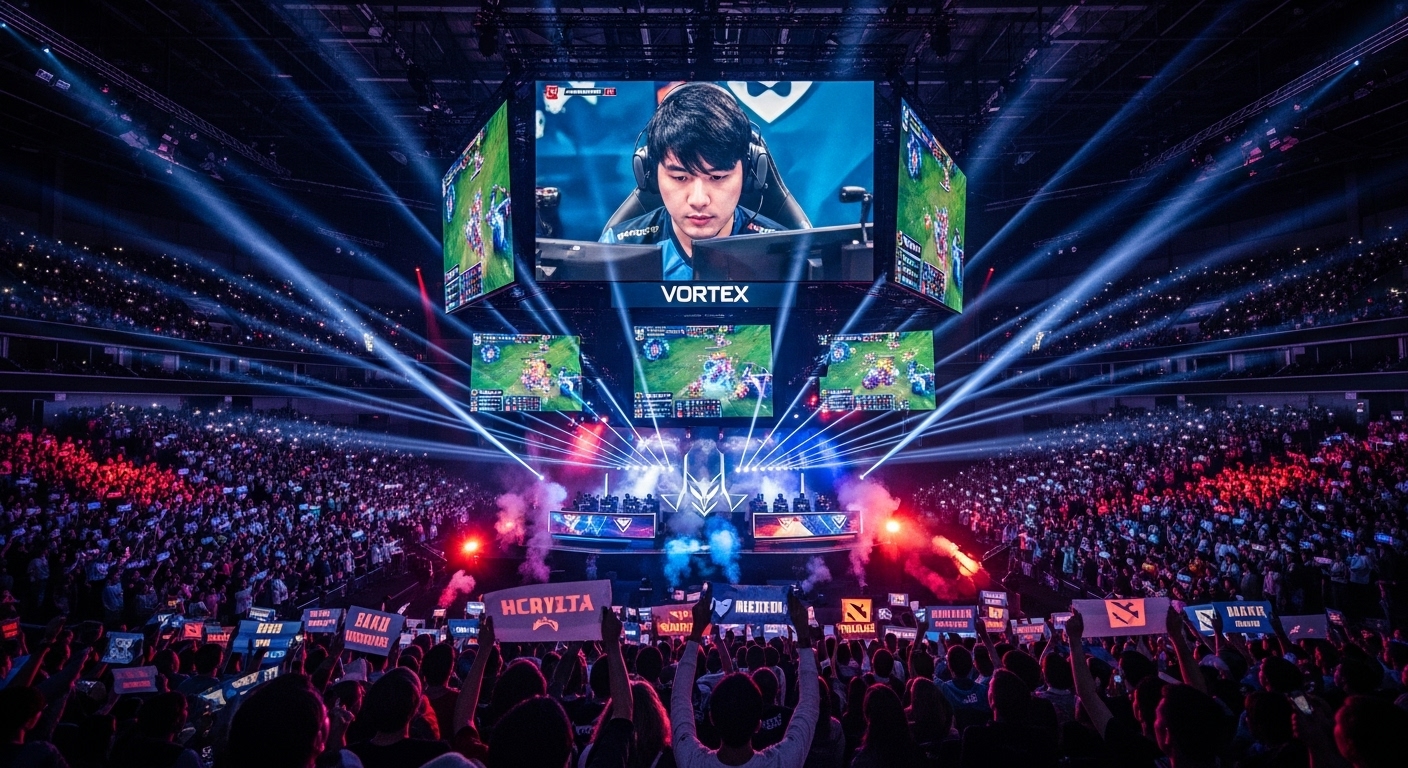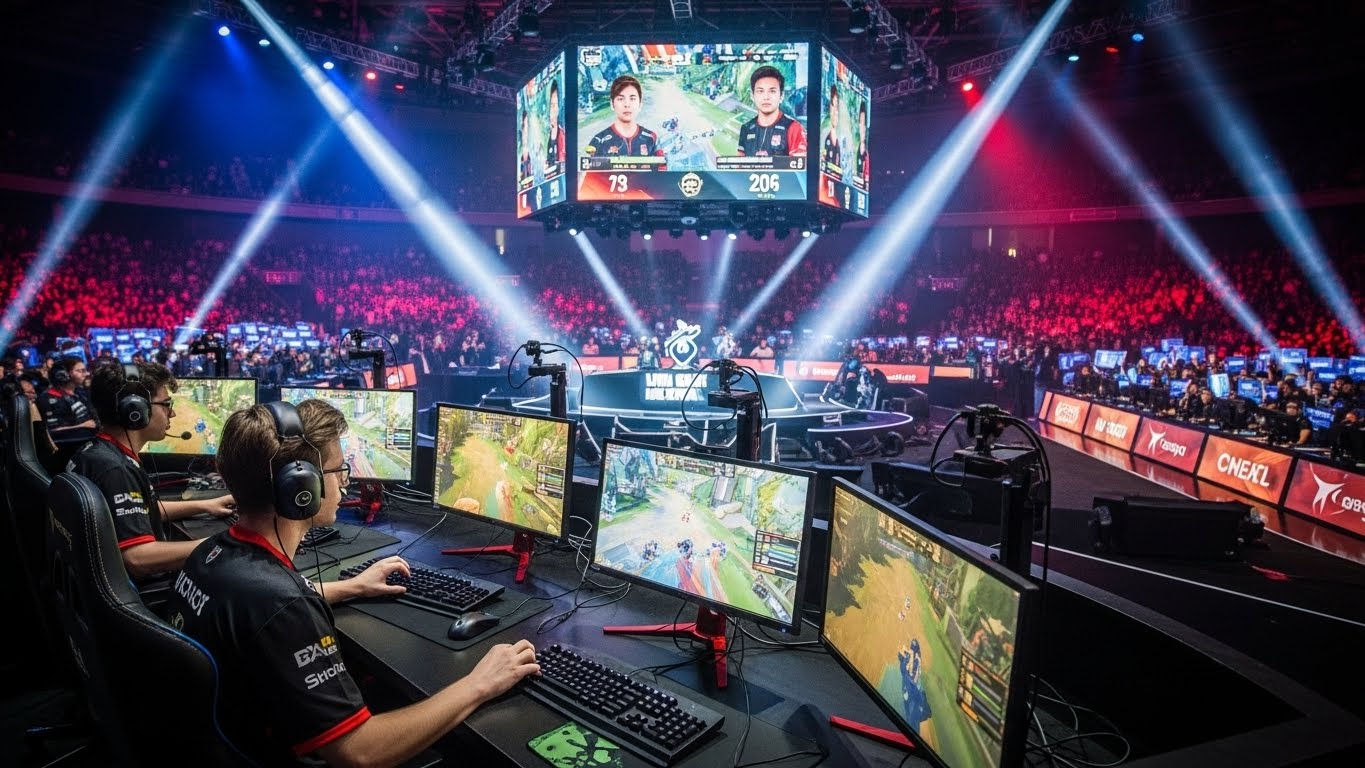Introduction to the World of Esports
Over the past two decades, the world has witnessed an extraordinary rise in the popularity and influence of esports. What was once a niche hobby for a small group of dedicated gamers has transformed into a global phenomenon that commands the attention of millions. Esports, short for electronic sports, refers to competitive video gaming where individuals or teams compete in organized tournaments. The scope of this digital competition now rivals that of traditional sports in terms of viewership, sponsorships, and global recognition. From its humble beginnings in small gaming arcades to packed arenas and massive online audiences, esports has evolved into a powerful cultural and economic force that continues to shape entertainment, technology, and society.
The Early Days of Esports
To understand the rise of esports, we must first travel back to its origins. Competitive gaming has existed in various forms since the 1970s, when video games began gaining popularity in arcades and early home consoles. One of the first recorded video game competitions took place in 1972 at Stanford University, where players competed in a game called “Spacewar.” Although it was a small event, it marked the beginning of organized competitive gaming.
By the 1980s, arcade gaming competitions were becoming more common, with titles like Pac-Man, Donkey Kong, and Space Invaders drawing dedicated players who sought to set high scores and gain recognition. The arrival of home gaming consoles such as the Atari and Nintendo Entertainment System expanded the gaming community further, allowing players to compete locally with friends and family. However, the infrastructure for global competition was still far from being realized.
The Internet Era and the Transformation of Gaming
The 1990s brought about a technological revolution that changed everything—the rise of the internet. With the internet’s expansion came the ability for players to connect, communicate, and compete with others across the globe. Games such as Doom, Quake, and StarCraft allowed online multiplayer experiences that were previously unimaginable. The competitive nature of these games naturally gave rise to early esports communities.
During this time, major tournaments began to form, and professional gaming teams started to emerge. South Korea played a significant role in this transformation, becoming a hub for competitive gaming and producing some of the earliest professional esports players. The country’s focus on internet infrastructure and gaming cafes, known as “PC bangs,” helped create a culture that embraced esports as both entertainment and profession.
The 2000s: A Decade of Growth and Globalization
The early 2000s marked the true globalization of esports. Games such as Counter-Strike, Warcraft III, Dota, and Halo defined this era, offering new competitive formats and team-based play. Esports tournaments became larger, more organized, and began to attract sponsorship from major brands. The development of platforms like Twitch and YouTube later in the decade gave esports a stage to reach massive audiences beyond physical arenas.
This decade also saw the birth of iconic esports organizations like Team Liquid, Fnatic, Cloud9, and Evil Geniuses. These teams competed professionally and began building brand identities that rivaled those of traditional sports clubs. The evolution of esports was no longer confined to a subculture—it was becoming a mainstream entertainment industry.
The Rise of Professional Players and Teams
As esports gained traction, professional players emerged as new-age celebrities. These individuals demonstrated extraordinary skill, reflexes, and game knowledge that separated them from casual gamers. Esports athletes began training rigorously, often practicing for many hours each day to refine their strategies, coordination, and teamwork.
With rising popularity came professionalization. Players were signed to teams, given contracts, and even received coaching and mental health support. Training facilities were established, mirroring those used by athletes in traditional sports. The top-tier players began earning salaries, sponsorship deals, and prize money that often reached millions of dollars annually.
Major Esports Titles That Shaped the Industry
The diversity of esports games has contributed significantly to the industry’s expansion. Each title brings its unique style, strategy, and fan base. Some of the most influential games in esports history include:
- League of Legends (LoL): Developed by Riot Games, this multiplayer online battle arena (MOBA) title became a global sensation. With massive international tournaments like the League of Legends World Championship, it helped establish the esports model of leagues, franchises, and structured competition.
- Counter-Strike: Global Offensive (CS:GO): A tactical first-person shooter by Valve, CS:GO is renowned for its intense gameplay and deep competitive scene. It remains one of the most-watched esports games worldwide.
- Dota 2: Another title by Valve, Dota 2’s The International tournament is famous for its record-breaking prize pools funded by player contributions.
- Overwatch: Blizzard’s team-based shooter brought a unique blend of characters and team dynamics, launching the Overwatch League, one of the first franchise-based esports leagues.
- Fortnite: Epic Games’ battle royale became a cultural phenomenon, merging esports competition with entertainment, music, and global pop culture.
- Valorant: A tactical shooter blending elements of CS:GO and hero-based gameplay, Valorant has quickly grown into one of the leading esports titles.
Each of these games has contributed to making esports diverse, inclusive, and constantly evolving, appealing to players and viewers from different backgrounds and gaming preferences.
Esports Infrastructure and Tournament Ecosystem
The esports ecosystem is vast and highly organized. At its core are the tournaments and leagues that serve as the main stage for competition. These events range from regional qualifiers to world championships held in packed stadiums. The infrastructure supporting esports includes game publishers, event organizers, broadcasters, sponsors, and media companies.
Large-scale events like The International, League of Legends World Championship, and CS:GO Majors attract millions of online viewers and thousands of live attendees. Production quality has reached cinematic levels, with commentary teams, live analysis, pre-game shows, and post-match interviews that rival major sports broadcasts.
Esports and Media: A New Age of Entertainment
The rise of live-streaming platforms revolutionized esports viewership. Twitch, YouTube Gaming, and other services made it possible for fans to watch live tournaments, follow their favorite players, and engage with content in real time. Unlike traditional sports broadcasts, esports streams often include interactive chats, commentary, and behind-the-scenes access, creating a stronger connection between players and fans.
This digital-first approach to entertainment has helped esports reach younger audiences who prefer online content over traditional television. Many esports events now rival or surpass traditional sports broadcasts in viewership, demonstrating the growing influence of digital entertainment.
The Business of Esports: Sponsorships, Revenue, and Growth
Esports has evolved into a multi-billion-dollar industry with diverse revenue streams. Major brands have recognized the marketing potential of esports, investing heavily through sponsorships, advertisements, and merchandise. Companies from technology, energy drinks, apparel, and even automotive sectors have aligned with esports teams and tournaments.
The business model of esports mirrors that of traditional sports—teams earn revenue through sponsorships, ticket sales, media rights, and merchandise. Tournament organizers and game publishers also generate significant income through partnerships, licensing, and digital content sales. Esports’ economic influence continues to expand as more investors and companies enter the space.
Cultural Impact and Global Reach
Esports is more than just gaming—it is a cultural movement. It has broken down geographical and linguistic barriers, uniting players and fans from every corner of the world. Esports athletes are seen as role models, inspiring younger generations to pursue careers in gaming, technology, and content creation.
Countries like South Korea, China, and the United States have become esports powerhouses, each with their own gaming cultures and leagues. The inclusion of esports in international events such as the Asian Games has further validated its status as a legitimate form of competition.
Education and Career Opportunities in Esports
The growth of esports has led to new educational and career paths. Universities around the world now offer esports scholarships, degrees in game design, and programs focused on esports management and broadcasting. Students are learning about the business, marketing, and technological aspects of the industry.
Beyond professional gaming, esports offers careers in event management, commentary, content creation, coaching, production, and journalism. This expanding ecosystem has created thousands of new jobs globally, contributing to economic development and innovation.
Challenges Facing the Esports Industry
Despite its success, esports faces several challenges. Player burnout is a significant issue due to intense practice schedules and performance pressure. Maintaining fair play through anti-cheat systems and integrity measures is also a constant battle. Additionally, as esports continues to grow, issues like gender representation, inclusivity, and mental health have come under greater scrutiny.
Another challenge lies in the dependence on game publishers. Unlike traditional sports, where governing bodies regulate competitions, esports titles are owned by private companies that control their games’ competitive structure. This creates complexities in governance and standardization.
The Future of Esports
Looking ahead, the future of esports appears brighter than ever. As technology continues to advance, virtual reality, augmented reality, and artificial intelligence are expected to enhance the gaming experience. Esports will likely expand into new platforms and devices, offering immersive and interactive experiences to audiences.
The integration of esports into mainstream sports and entertainment will also continue. Traditional sports franchises are investing in esports teams, and governments are recognizing esports as an official sport. The boundaries between gaming, entertainment, and sports are becoming increasingly blurred, signaling a future where esports stands shoulder to shoulder with traditional athletic competitions.
Esports and the Next Generation
The younger generation is driving the esports revolution. For millions of teenagers and young adults, esports is not just a hobby but a lifestyle. They watch streams, follow tournaments, and aspire to become professional players. Esports’ integration into education and youth programs will ensure that it continues to flourish as a mainstream pursuit.
Parents, educators, and institutions are gradually recognizing the positive potential of esports. When managed responsibly, competitive gaming promotes teamwork, strategic thinking, communication, and discipline—skills that are valuable both inside and outside the digital arena.
Conclusion: The Unstoppable Rise of Esports
From arcade competitions in the 1970s to global tournaments with millions of spectators, esports has come a long way. It has redefined entertainment, connected people across borders, and established itself as a legitimate profession and industry. The combination of technology, creativity, and community has transformed gaming into a global cultural powerhouse.
Esports continues to evolve, adapt, and inspire. It represents the digital age’s spirit—dynamic, innovative, and inclusive. As new generations embrace gaming, the world of esports will continue to expand its horizons, offering new opportunities, new heroes, and new stories that shape the future of competitive entertainment.
The journey of esports is far from over. In many ways, it has only just begun—a revolution that continues to push the limits of what human creativity and technology can achieve together.



